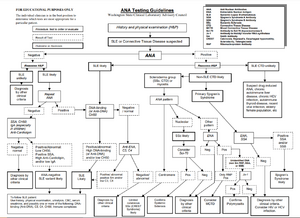Extractable nuclear antigen
Extractable Nuclear Antigens (ENAs) are a type of over 100 different soluble cytoplasmic and nuclear antigens.
Etiology[edit]
These nuclear antigens are known as “extractable” because they can be removed from cell nuclei using saline and represent six main proteins: Ro, La, Sm, RNP, Scl-70, Jo1.
Nuclear riboproteins[edit]
- Most ENAs are part of spliceosomes or nucleosomes complexes and are a type of small nuclear ribonucleoprotein (snRNPS).
- The location in the nucleus and association with spliceosomes or nucleosomes results in these ENAs being associated with additional RNA and proteins such as polymerases.
- This quality of ENAs often makes it difficult to purify and quantify their presence for clinical use.

Clinical Applications[edit]
An extractable nuclear antigen panel, or an ENA Panel, tests for presence of autoantibodies in the blood that react with proteins in the cell nucleus. Usually done as a follow up to a positive antinuclear antibody (ANA) test and one is showing symptoms of an autoimmune disorder. The ANA tests for the presence or absence of autoantibodies, while the ENA panel evaluates which proteins in the cell nucleus the autoantibodies recognize. The ENA panel helps diagnosis, distinguish between, and monitor the progression of autoimmune diseases and is performed with a simple blood draw. While the levels of autoantibodies may fluctuate through one's life, once you develop autoantibodies, you will always have them. Autoantibodies to these antigens are associated with particular connective tissue disorders. Indeed, in 84.3% of positive anti-ENA samples, ANA reagents were also found.
ENA[edit]
Anti-ENA is a grouping of antibodies often used to screen for mixed connective tissue disease (MCTD), Sjögren's syndrome and systemic lupus erythematosus and commonly is composed of six tests:
- anti-Sm (for SLE)
- anti-RNP (for MCTD)
- anti-La/anti-SS-B (for Sjögren's)
- anti-Ro/anti-SS-A(for Sjögren's)
- anti-Scl70 (for Scleroderma)
- anti-Jo (for Dermatomyositis)
Sensitivity and specificity of these tests depends on the type of assay employed, and will therefore vary by lab. The following table illustrates the sensitivity and specificity of ENA antibodies at detecting SLE with the ELISA technique.
| Antibody (tested using ELISA) | Sensitivity (%) for SLE | Specificity (%) for SLE |
|---|---|---|
| Anti-Ro (SS-A) | 61 | 80-93 |
| Anti-La (SS-B) | 27-35 | 88-97 |
| Anti-Sm | 34-45 | 88-100 |
| Anti-RNP | 39-64 | 84-97 |
In addition, the use of ENA testing has also been used for the study of wheat related disorders such as celiac disease. A study conducted in 2018 screened patients with wheat related disorders for 10 anti-ENA antibodies.
- SSA (Ro)
- SSB (La)
- RNP/Sm
- Jo-1
- Sm
- Scl-70
- Chromatin
- Centromere
- Histone
- RNA polymerase III
73% of celiac disease subjects tested positive for anti-histone and was the most prevalent, which is typically associated with Drug-induced lupus erythematosus. This implicates a high probability of an autoimmune disorder in patients with wheat-related disorders.
| Autoantibodies | ||||||||||
|---|---|---|---|---|---|---|---|---|---|---|
|
Ad. Transform your life with W8MD's Budget GLP-1 injections from $75


W8MD offers a medical weight loss program to lose weight in Philadelphia. Our physician-supervised medical weight loss provides:
- Weight loss injections in NYC (generic and brand names):
- Zepbound / Mounjaro, Wegovy / Ozempic, Saxenda
- Most insurances accepted or discounted self-pay rates. We will obtain insurance prior authorizations if needed.
- Generic GLP1 weight loss injections from $75 for the starting dose.
- Also offer prescription weight loss medications including Phentermine, Qsymia, Diethylpropion, Contrave etc.
NYC weight loss doctor appointmentsNYC weight loss doctor appointments
Start your NYC weight loss journey today at our NYC medical weight loss and Philadelphia medical weight loss clinics.
- Call 718-946-5500 to lose weight in NYC or for medical weight loss in Philadelphia 215-676-2334.
- Tags:NYC medical weight loss, Philadelphia lose weight Zepbound NYC, Budget GLP1 weight loss injections, Wegovy Philadelphia, Wegovy NYC, Philadelphia medical weight loss, Brookly weight loss and Wegovy NYC
|
WikiMD's Wellness Encyclopedia |
| Let Food Be Thy Medicine Medicine Thy Food - Hippocrates |
Medical Disclaimer: WikiMD is not a substitute for professional medical advice. The information on WikiMD is provided as an information resource only, may be incorrect, outdated or misleading, and is not to be used or relied on for any diagnostic or treatment purposes. Please consult your health care provider before making any healthcare decisions or for guidance about a specific medical condition. WikiMD expressly disclaims responsibility, and shall have no liability, for any damages, loss, injury, or liability whatsoever suffered as a result of your reliance on the information contained in this site. By visiting this site you agree to the foregoing terms and conditions, which may from time to time be changed or supplemented by WikiMD. If you do not agree to the foregoing terms and conditions, you should not enter or use this site. See full disclaimer.
Credits:Most images are courtesy of Wikimedia commons, and templates, categories Wikipedia, licensed under CC BY SA or similar.
Translate this page: - East Asian
中文,
日本,
한국어,
South Asian
हिन्दी,
தமிழ்,
తెలుగు,
Urdu,
ಕನ್ನಡ,
Southeast Asian
Indonesian,
Vietnamese,
Thai,
မြန်မာဘာသာ,
বাংলা
European
español,
Deutsch,
français,
Greek,
português do Brasil,
polski,
română,
русский,
Nederlands,
norsk,
svenska,
suomi,
Italian
Middle Eastern & African
عربى,
Turkish,
Persian,
Hebrew,
Afrikaans,
isiZulu,
Kiswahili,
Other
Bulgarian,
Hungarian,
Czech,
Swedish,
മലയാളം,
मराठी,
ਪੰਜਾਬੀ,
ગુજરાતી,
Portuguese,
Ukrainian


